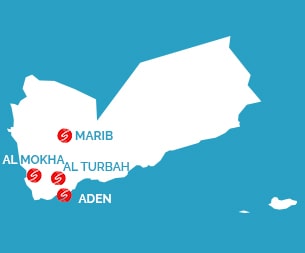After more than 3 years of war, life in Yemen looks more like survival. Every day, families struggle to find food, water or health care. Three daily challenges that our teams are trying to improve.
By Philippe Bonnet, Country Director
ACCESS TO WATER HAS BEEN DESTROYED
The situation before the conflict was already not brilliant, especially in the south of the country – less developed – and in rural areas, without being catastrophic. But years of conflict have contributed to infrastructure attrition. On one hand, in some areas where the fighting took place, infrastructure was destroyed by bombing (by both sides) and fighting. The combatants did not hesitate to use some of these infrastructures for military purposes. Drinking water distribution systems have been particularly affected, as have health facilities and schools, for example. On the other hand, the resources available to the State are mainly allocated to the war effort in detriment of maintenance, upkeep and even the coverage of infrastructure operating costs. This attrition of infrastructure therefore affects not only the combat zones but the whole country. Finally, the functioning of these infrastructures is still based on thermal energy production systems, requiring fuel whose cost is constantly increasing. Today, the functioning of infrastructures depends largely on the contribution of NGOs, including SOLIDARITÉS INTERNATIONAL. One of the strategies implemented by SOLIDARITÉS INTERNATIONAL is the replacement of thermal engines by solar pumping systems.
A DESTROYED HEALTH SYSTEM
The public health system has been severely affected by the conflict: destruction of infrastructure, unpaid staff, medicines and lack of equipment. Many of the health centres and hospitals are now able to operate only with the support of NGOs. In large cities, the private health sector remains more or less functional, but many households cannot access it due to lack of resources. Rural areas and less accessible areas certainly face the most critical situations, particularly because many NGOs are reluctant to access these areas where assistance is certainly more expensive with populations scattered over large geographical areas. Finally, it is important not to forget to mention the situation of the displaced. There are 3 million of them in the country whose access to healthcare is more than uncertain. Our teams are trying to reach these populations by supporting health centres (on the water, hygiene and sanitation components) in rural areas. But raising funds for these activities, which are less in the spotlight because they are not directly related to the fighting, is difficult.
Yemen
Context and action- 32.98 million inhabitants
- 183rd out of 191 countries on the Human Development Index
- 341.280 people helped
FOOD AVAILABLE BUT TOO EXPENSIVE
More than 22 million Yemenis depend on international aid either because funding is not sufficient, or because some areas of the country are difficult to access. Clearly, not all food needs – not to mention access to safe drinking water – are not covered and most districts in the country are considered food insecure and malnutrition rates are high, almost 2 million children suffer from malnutrition.
Food is often available, sometimes locally produced, most often imported, but modest households (in increasing numbers) are finding it more and more difficult to buy the food they need to cover their basic food needs. Once again, NGOs, including SOLIDARITÉS INTERNTATIONAL, are working to identify the most vulnerable families in order to provide them with food assistance, either through food distributions or by providing them with financial support. With the war, Yemen’s hectic economy collapsed and food supplies now increasingly depend on food imports. With soaring inflation, rising fuel prices, food prices – imported or not – are soaring and the situation is worsening: fewer and fewer families can cover their food needs, which is very worrying. NGOs will probably not be able to cover all the needs.
SUPPORT OUR ACTIONS IN YEMEN
Photo : Thomas Gruel / SOLIDARITÉS INTERNATIONAL

